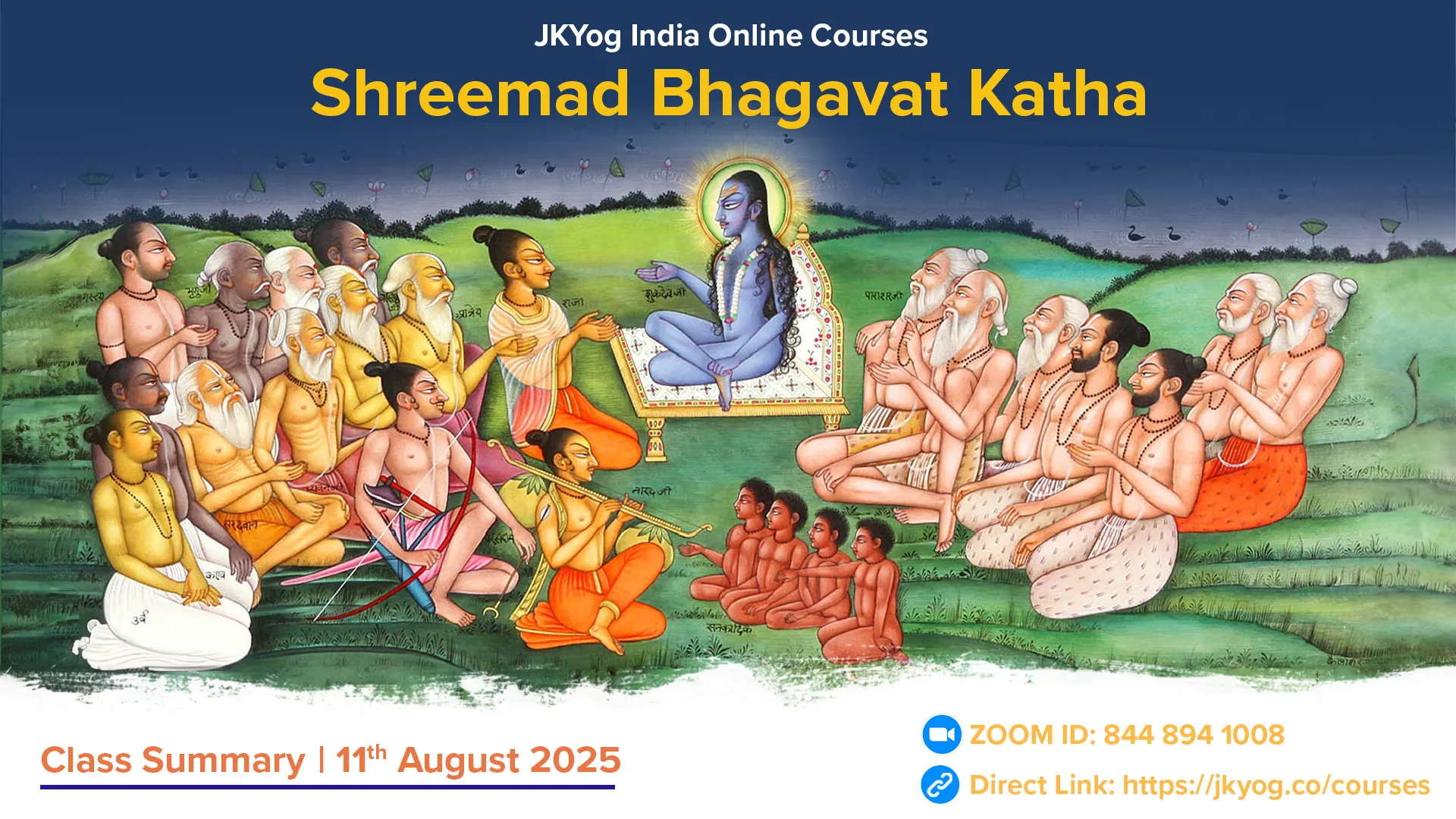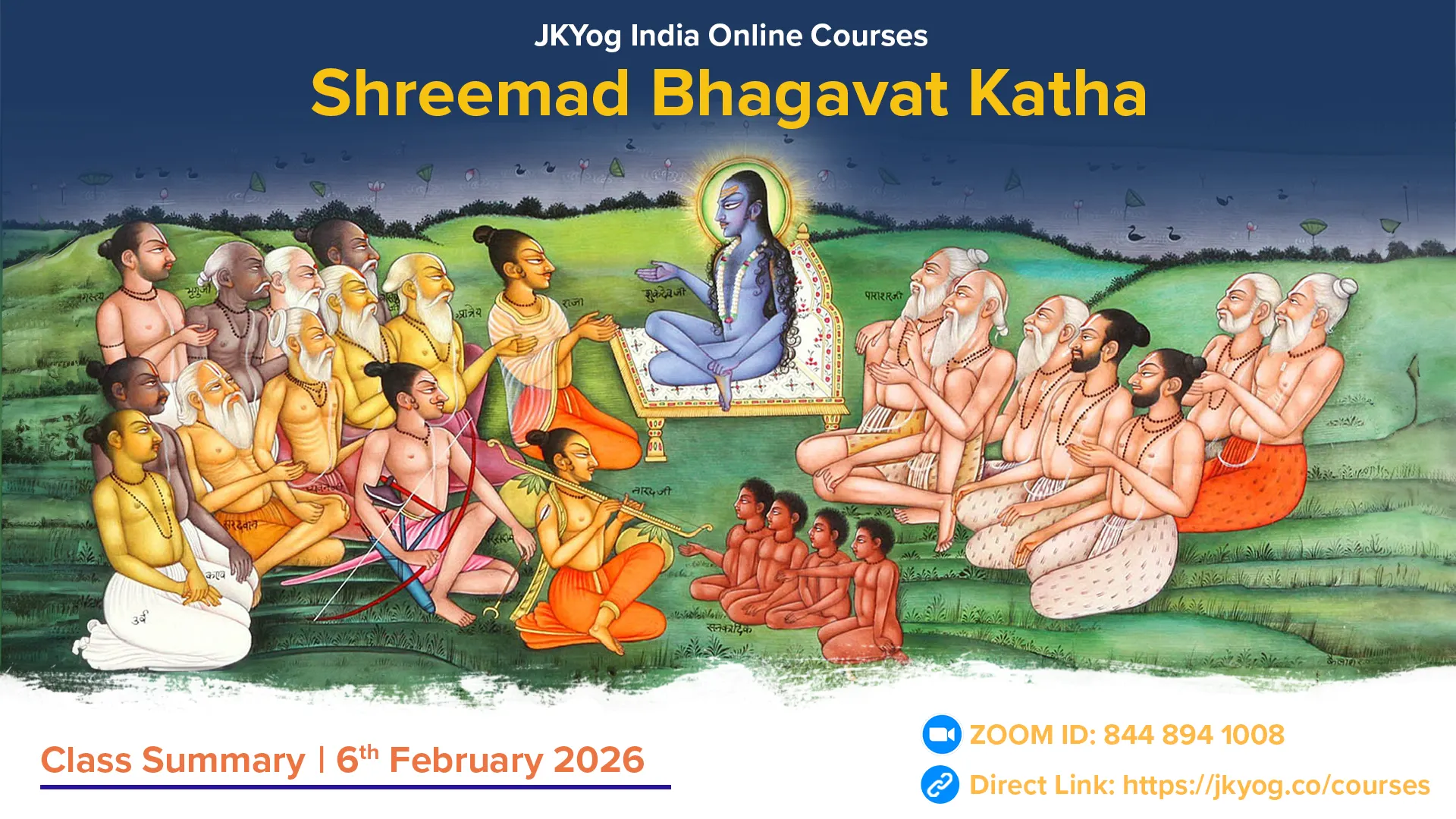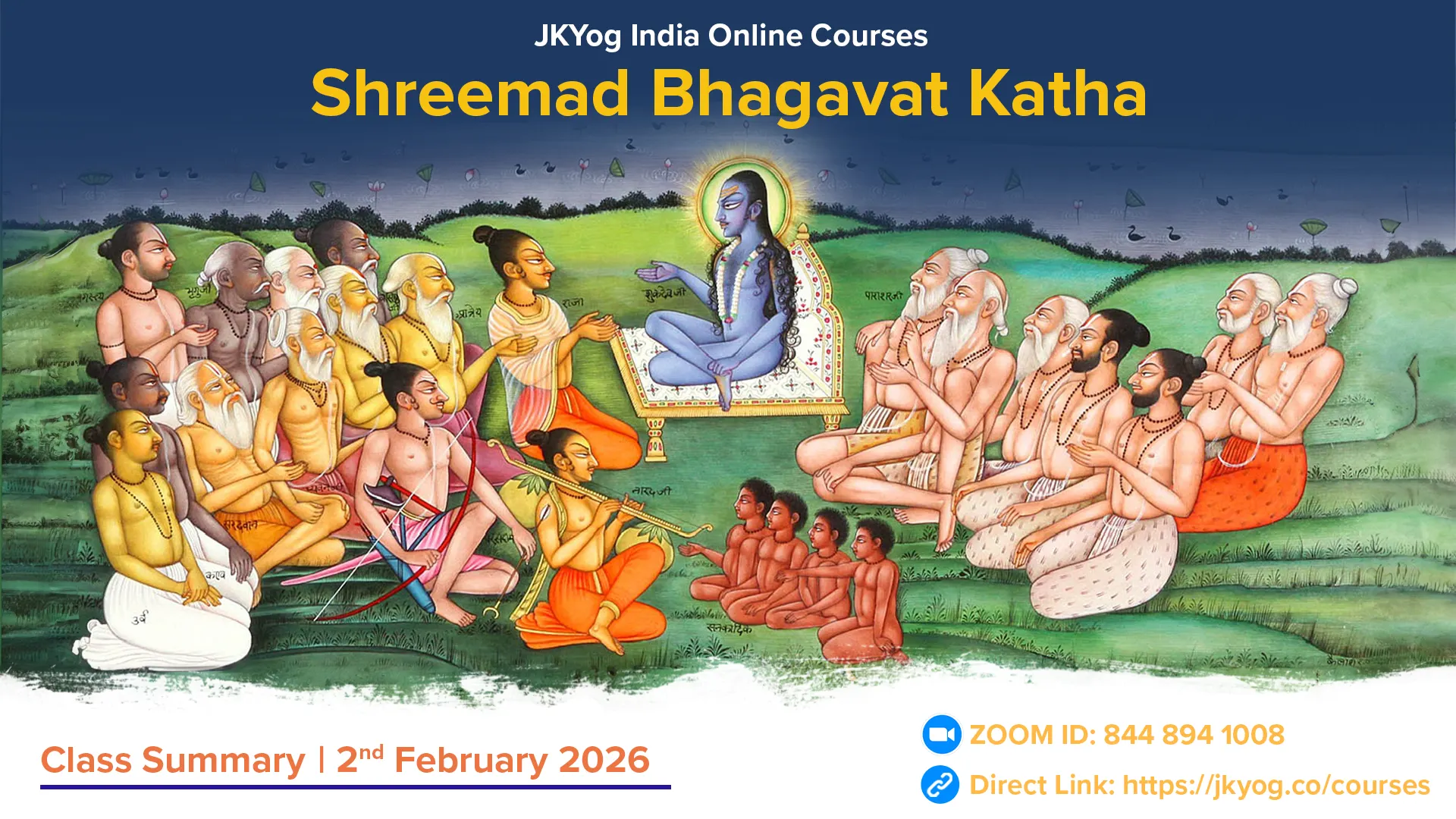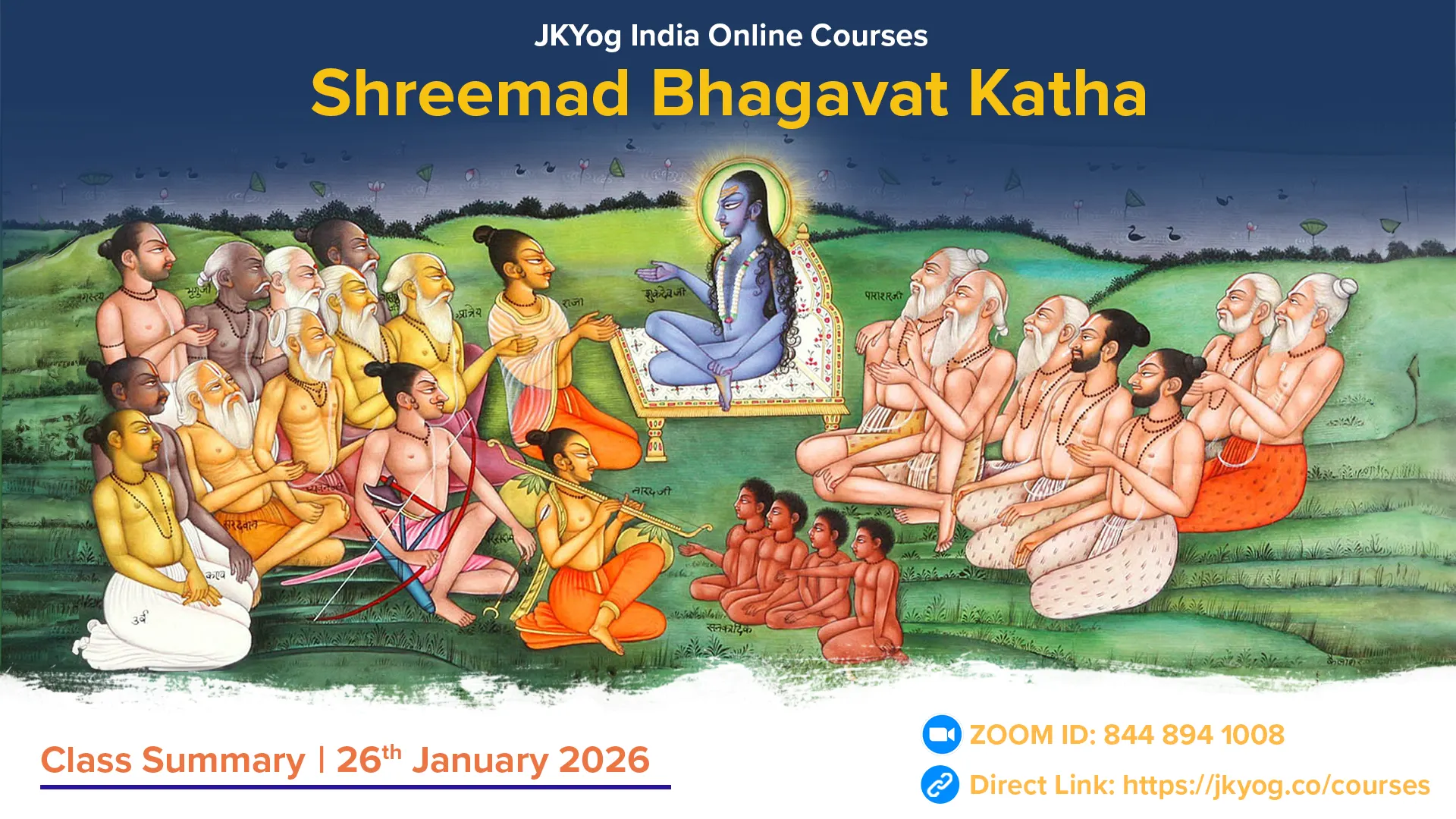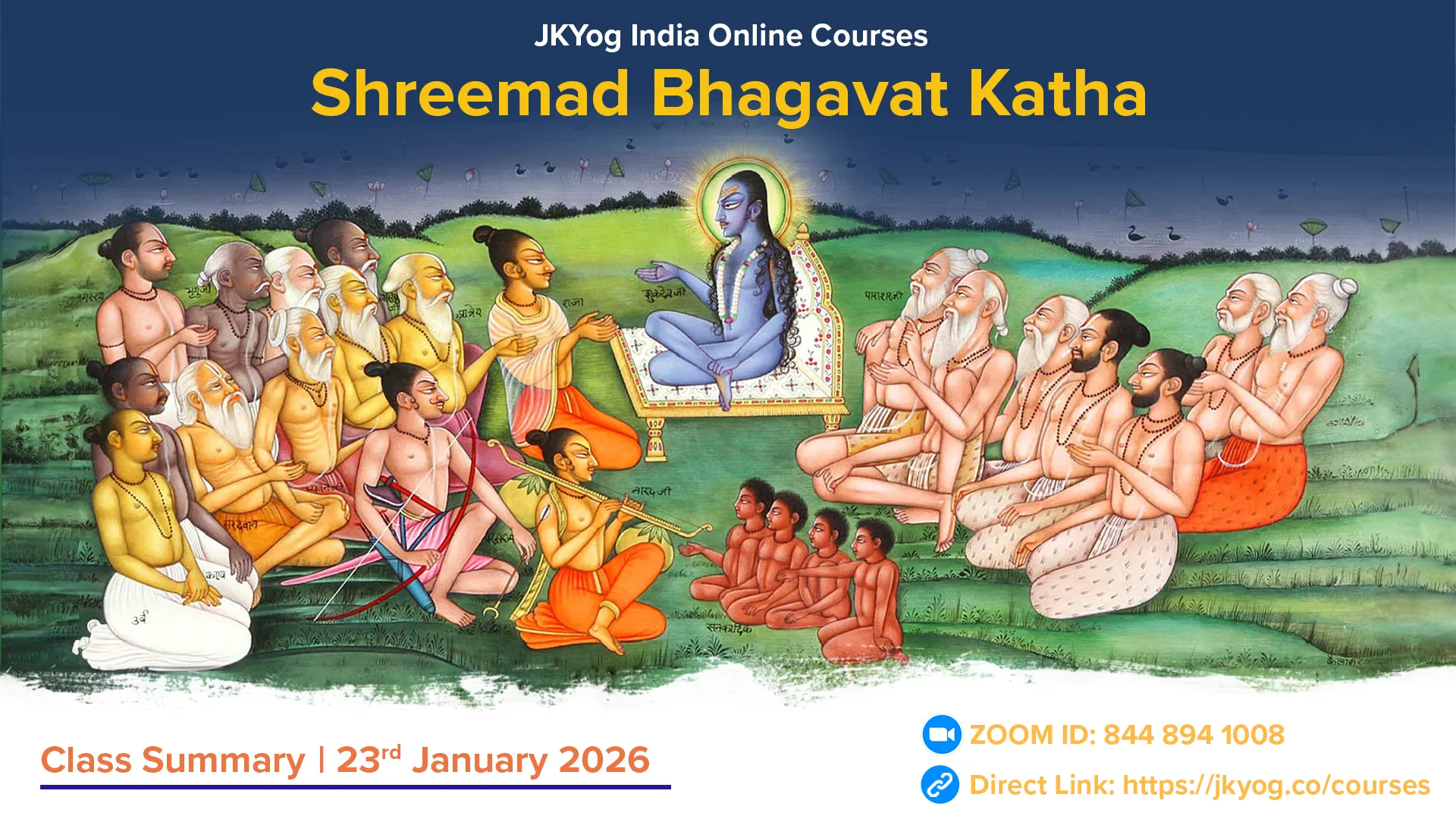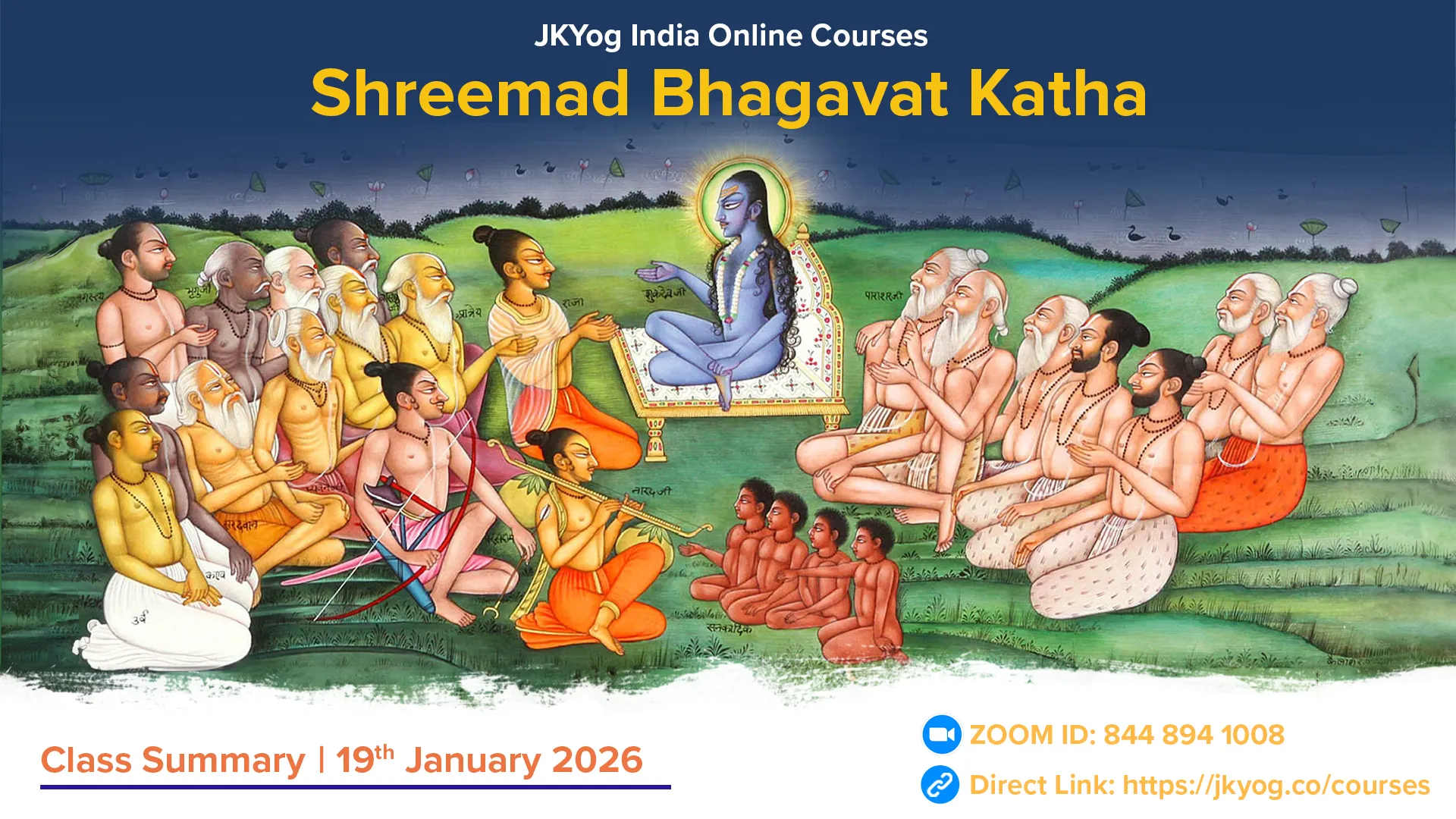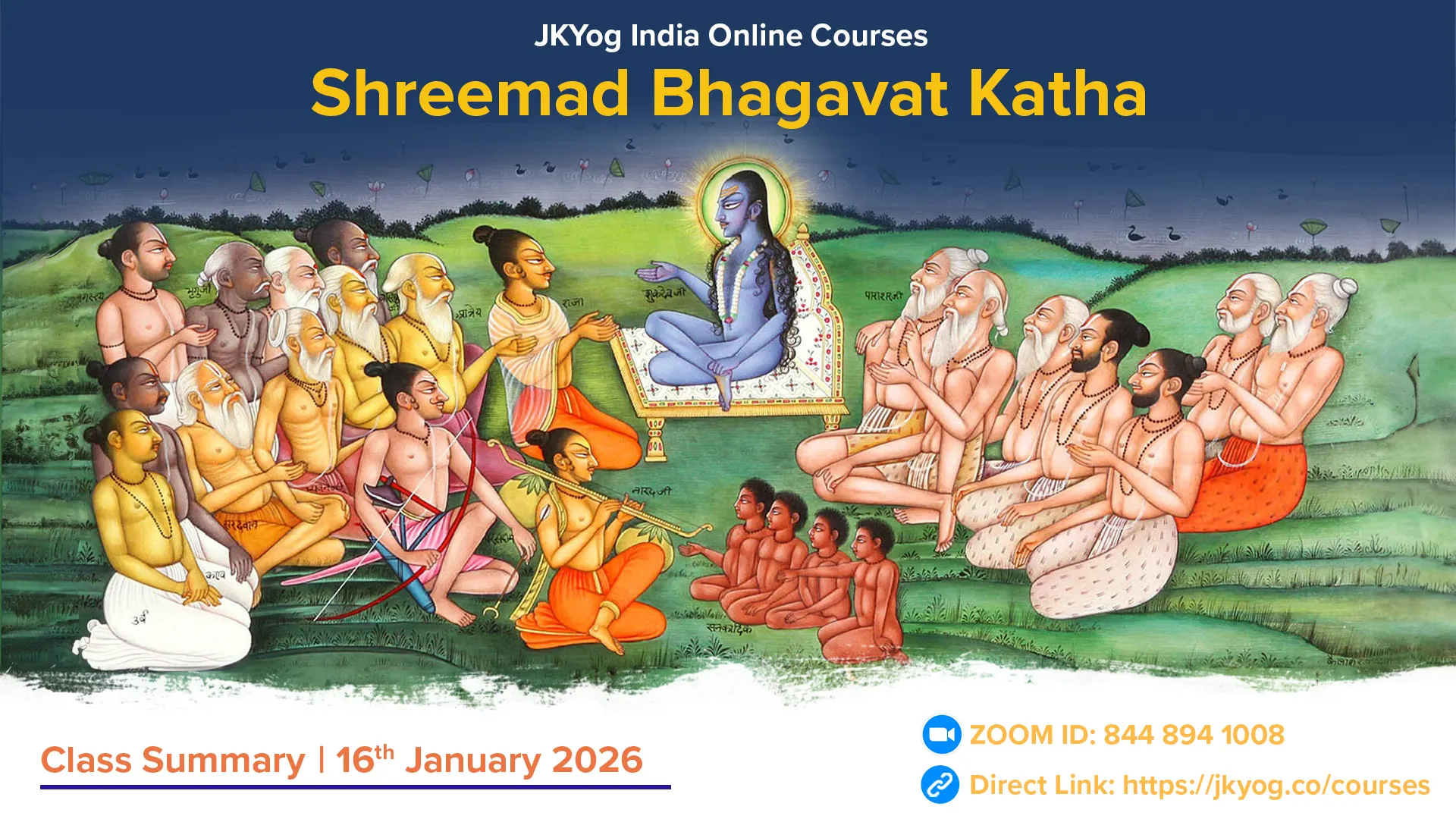Shreemad Bhagavat Mahapuran- Canto: 9, Chapters: 8-9
Shree Shukdevji says — King Harishchandra’s son was Rohit, whose son was Harit. From Harit was born Champa, who established the city of Champapuri. From Champa came Sudev, and from him was born Vijay. Vijay’s son was Bharuk, Bharuk’s son was Vrik, and Vrik’s son was Bahuk. Bahuk was deprived of his kingdom by his enemies, so he went to the forest along with his wife. In the forest, due to old age, he passed away. His wife was about to commit sati, but Sage Aurva stopped her, as she was pregnant.
Bhagwan Kapil’s Fiery Glance and the Fate of Sagar’s Sons
When the other wives of King Bahuk learned that she was with child, envy arose in their hearts. Out of jealousy, they mixed poison into her food. Yet, by the will of Providence, the poison could not harm the life in her womb. In due time, the child was born carrying that very poison within him, and hence he was named Sagar. In the course of time, Sagar became a mighty emperor, renowned, valorous, and sovereign of the earth.
Once, King Sagar undertook the Ashwamedha Yajna. But Indra, ever envious of the glory of kings, stole away the sacrificial horse. From Queen Sumati were born sixty thousand sons to Sagar. At their father’s command, they searched the earth in every direction. Yet, unable to find the horse, arrogance swelled in their hearts. In their pride, they began to dig deep into the bosom of the earth, as though to tear her apart.
Digging thus, they came at last to the hermitage of the divine sage Kapil, in the north-eastern quarter, and there indeed stood the stolen horse. Deluded by wrath and blinded by pride, they took that sage to be the thief himself. Indra’s illusion stole their intelligence, and so they dared to insult one who was none other than Bhagwan Himself, dwelling there in yogic meditation.
When the sons of Sagar advanced to attack, Kapil Bhagwan slowly opened His eyes. At once, from His mere glance, a blazing fire arose within their bodies. In that very instant, the sixty thousand princes were consumed and reduced to ashes upon the earth.
Shukadev says, “O King, it is not fitting to think that the sons of Sagar were burnt by the anger of Kapil, for Kapil is Bhagwan Himself. In Him, who is beyond the three modes, there can never be anger or pride. Just as the vast sky is untouched by the dust of the earth, even so, He is untouched by notions of friend or foe. He appeared only to bestow the supreme knowledge of Sankhya, the divine science, which is like a boat to carry the soul across the ocean of birth and death. Those who seek liberation may cross by His grace to the other shore.”
Now hear of the lineage further: Sagar’s second queen, Keshini, bore a son named Asamanjas. He, in turn, begot Anshuman, who was righteous, obedient, and devoted in service to his grandsire, King Sagar. Asamanjas, in a former life, had been a great yogi. But by ill association, he had fallen from yog. Retaining memory of his past birth, he deliberately performed acts that displeased the people. At times, he behaved so abominably that all thought him mad, for he would cast innocent children into the sacred river Sarayu. The citizens were terrified by his conduct.
At last, King Sagar disowned Asamanjas and deprived him of the throne. Yet before departing, Asamanjas, by his yogic power, restored all the children to life and revealed them to his father. Thereafter, he retired into the forest.
When the people of Ayodhya beheld their children alive again, they were astonished beyond measure, and King Sagar was struck with deep remorse over his son.
Sagar’s Lineage and the Penance that Brought Ganga to Earth
Thereafter, by the command of King Sagar, his grandson Anshuman set out in search of the sacrificial horse. Following the shores of the ocean, he came upon the very place where the ashes of his sixty thousand uncles lay. There he beheld the yajna horse standing near the radiant presence of Bhagwan Kapil.
Approaching with profound humility, Anshuman bowed low and, with a concentrated mind, offered heartfelt praises:
"O Bhagwan! You are unborn, beyond even Brahma, whom You empower, and thus even he cannot directly behold You. How then can ignorant beings like us comprehend Your greatness? All creatures in this world are bound by the three modes—sattva, rajas, and tamas—and, bewildered by Your maya, they remain entangled in external objects. But You are formless, indivisible, the embodiment of pure knowledge. In You, maya and its qualities can never exist. You assume a body only for the purpose of imparting divine knowledge. By the mere vision of You, my delusion is destroyed."
Hearing Anshuman’s prayer and beholding his humility and devotion, Bhagwan Kapil was pleased and, moved by compassion, said within Himself:
"O King, this horse belongs to your grandfather; return it to him. As for your uncles, who have been reduced to ashes here, know that their deliverance can come only through the sacred waters of Ganga. There is no other means for their redemption."
Anshuman thus retrieved the horse and returned. King Sagar completed the yajna and, entrusting the kingdom to Anshuman, departed to the eternal realm of the Supreme.
Thereafter, Anshuman, with a steadfast heart, undertook long and severe austerities for bringing Ganga down to earth, but success did not crown his efforts. In due time, he departed this world. His son Dilip, too, performed the same rigorous penance, yearning for Ganga’s descent. Yet he also did not succeed, and in the course of time, he left his mortal frame.
When Bhagirath’s Penance Brought Ganga to Earth
King Dilip’s son, Bhagirath, made a vow to bring the Ganga down to earth and deliver his forefathers. With unshakable resolve, he undertook severe austerities. His penance shook the heavens, and one day Bhagawati Ganga appeared before him, radiant and flowing with divine brilliance.
“I am pleased with your devotion,” She said. “Ask for any boon you desire.”
Bhagirath bowed deeply and prayed with folded hands, “Mother, please descend to the mortal world, so that my ancestors may be delivered.”
Ganga replied with gravity, “My descent is not so simple. When I fall from the heavens, my torrent will be so fierce that it will shatter the earth and plunge into the netherworld. Who will sustain my force? And another matter — when mortals bathe in me to wash away their sins, where will I go to rid myself of those countless impurities?”
Bhagirath, calm and unwavering, answered, “Mother, the sages of the earth, free from worldly desires, ever devoted to Brahman, and filled with compassion for all beings, will purify you with the very touch of their presence, for in their hearts resides the Supreme. As for your unstoppable torrent, Bhagwan Shankar Himself will bear you, for just as threads are woven into cloth, this entire universe rests upon Him.”
Hearing his words, Ganga agreed. Bhagirath then turned his penance towards Mahadev. His devotion was so intense that soon, Shankarji appeared before him, smiling, and said, “So be it.” With His matted locks, Shiva received Ganga’s mighty descent, breaking her fury into countless gentle streams.
Once pacified, Ganga flowed upon the earth, following behind Bhagirath’s chariot. Wherever she passed, the land was sanctified. Villages, forests, and deserts were all blessed by her touch. Finally, Bhagirath led her to the sacred spot where the ashes of his sixty thousand forefathers lay. As their ashes mingled with Ganga’s purifying waters, those souls once thought doomed attained liberation and ascended to heaven.
Shukadevji narrates to Parikshit, “If even the ashes of sinners can gain liberation through mere contact with Ganga, imagine the glory that awaits those who bathe in her with devotion and discipline. Is it surprising? Not at all, for she has sprung from the very feet of the Supreme Lord, whose remembrance alone frees sages from the grip of the three gunas and leads them to divine union.”
And thus, the lineage continued: from Bhagirath was born Shrut, from Shrut came Nabh (different from the earlier Nabh), then Sindhudweep, then Ayutayu. From Ayutayu came Ritupurna, a friend of King Nala, who exchanged with him the secrets of the game of dice and the science of horses. Ritupurna’s son was Sarvakama, and his son was Sudas, who carried forth the illustrious line.
The Story of King Saudasa
Sudasa’s son was Saudasa. He is also sometimes called Mitrasaha and in some places known as Kalmasapada.
Once, King Saudasa went on a hunt. There, he killed a rakshas, but spared the rakshas’s brother. That surviving rakshas, seeking revenge, disguised himself as a cook and entered the king’s palace. One day, when Guru Vashishth came to dine, the disguised rakshas served him human flesh.
When Vashishthji saw this, he became enraged and cursed King Saudasa to become a rakshas. Later, when the truth came to light, he reduced the curse’s duration to only twelve years. At that time, King Saudasa too was preparing to curse Vashishth in retaliation by consecrating water in his hand, but his wife Madayanti stopped him. Instead of pouring the water on the ground, he let it fall upon his feet. Because of this, his feet turned black, and he came to be known as Mitrasaha and Kalmasapada.
While under the curse, Kalmasapada, in rakshas form, once saw a Brahmin couple engaged in union in the forest. Driven by hunger, he seized the Brahmin. The Brahmini pleaded with him, reminding him that he was once a king and should not commit such adharma. She expressed her desire for a child and explained that her husband’s wish remained unfulfilled, so he should release him. “If you still insist on killing him, then kill me first, because without him I cannot survive even for a moment,” she said.
But, under the effect of the curse, Saudasa ignored her plea and devoured the Brahmin as a tiger eats its prey. Seeing that her husband, with whom she was on the verge of conceiving, had been eaten by the rakshas-king, the Brahmini was overcome with grief and anger. She cursed him, “O sinner! Even before I fulfilled my desire for union, you devoured my husband. Therefore, whenever you seek union with a woman, death will at once befall you.” After cursing him, she collected her husband’s bones, leapt into the funeral pyre, and became sati, attaining the same destiny as her husband.
After twelve years, Saudasa was freed from the curse. When he approached his wife, Madayanti, she restrained him, reminding him of the Brahmini’s curse. Thereafter, the king renounced all conjugal pleasures and remained without offspring.
Later, by the power of Vashishthji’s mantras, Madayanti conceived. She remained pregnant for seven years but did not give birth. Then, Vashishthji struck her abdomen with a stone (ashma), and the child who was born was named Ashmaka(born of a stone).
From Ashmaka was born Mulaka. When Parashuramji exterminated the Kshatriyas from the earth, women secretly preserved Mulaka, and thus he also came to be known as Narikavacha (protected by women). He was called Mulaka because, after the earth had been left without Kshatriyas, he became the root and restarter of the dynasty.
Mulaka’s son was Dasharatha, Dasharatha’s son was Aidavid, and Aidavid’s son was King Vishvasaha.
King Khatvanga: God-Realisation in Just Two Ghadis
Vishwasaha’s son, Raja Khatvanga, was the very embodiment of valour. None could defeat him on the battlefield. At the request of the devas, he destroyed the asuras and restored victory to the devas. However, when the devas revealed to him the secret that only two ghadis (48 minutes) of his life remained, he did not waver in the least.
Raja Khatvanga immediately returned to his capital and, sitting upon his royal throne, immersed himself in deep contemplation. Speaking to his innermost self, he said, “Wife, children, wealth, kingdom, all of these are fleeting. The true foundation of my life is only devotion to Bhagwan. Since childhood, I have never turned my gaze toward adharma. My heart has never been ensnared in worldly pleasures. My soul has always been drawn to the lotus feet of Shree Hari.”
The devas wished to grant him boons and offer worldly pleasures, but Khatvanga rejected them all. His heart declared, “These enjoyments are like the illusory cities of the gandharvas in the sky, momentary and perishable. All this is subject to Maya. What I yearn for is that supreme Lord, eternal and imperishable.”
Shukadevji Maharaj says to Parikshit, “God had already drawn Raja Khatvanga’s intellect toward Himself. That is why, at the final moment, he was able to resolve it in this way. He renounced the false identification of the self with the body and other non-self objects and became established in his true self. That self is none other than Parabrahman, subtler than the subtlest, appearing like the void, yet not void, but the Supreme Truth. The devotees describe that very Reality as Bhagwan Vasudev.”
Summary: JKYog India Online Class- Shreemad Bhagavat Katha [Hindi]- 11.08.2025

